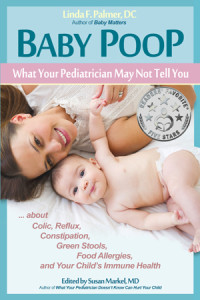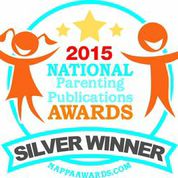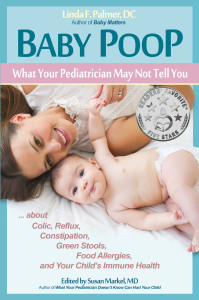About “BABY POOP”
Baby Poop
What Your Pediatrician May Not Tell You
… about Colic, Reflux, Constipation, Green Stools, Food Allergies, and
Your Child’s Immune Health
by Linda F. Palmer, DC
Edited by pediatrician Susan Markel, MD
Eat, sleep, and poop. That’s what babies do. Every parent has challenges and questions about these activities and there is an abundance of information on eating and sleeping, but poop? The appearance and behavior of a child’s stools can give more information about the child’s health than any other factor, but we just don’t seem to like to talk about it.
From an award-winning, three-time author—and a mother—Baby Poop brings the hard-to-find facts that equip parents to help their babies be happier and healthier, head off the occasional dire situation, and to optimize their child’s lifelong health.
Yes—poop. Parents spend inordinate amounts of time worrying about what goes into their babies. All the while, what shows up in baby’s diapers provides tremendous cues about baby’s digestion, immune functioning, and overall wellness. We don’t get explanations or even pointing fingers from babies: We get smiles or tears, and we get poop.
Baby Poop is about child health dilemmas faced in industrialized nations. These are distinctly different from the challenges in less developed countries, as most of these challenges are caused directly by modernization. Infectious disease rates are high in many less developed parts of the world, with high infant and child mortality rates—but industrialization, medicine, and money are not the end-all answers to optimal child survival. Baby Poop illuminates how a much larger portion of children in developed nations suffer from colic, reflux, food allergies, asthma, autism, and diabetes than those in the developing world—and how modern practices are encouraging these.
Baby Poop presents evidence from science and medical studies—accented by the collective wisdoms of mothers, midwives, lactation consultants, and other infant care specialists—and provides options that are shown to optimize children’s health. Written with new parents in mind, even the most experienced lactation, birthing, or pediatric professional will find many new pearls of information throughout the text.
It’s clear that Palmer has had plenty of experience with baby poop physiology and has researched the literature thoroughly, for our benefit. Palmer also fully recognizes that every family has its own unique needs, desires, and challenges, so she does not promote a one-size-fits-all agenda. Never judgmental, Baby Poop expands the evidence-based options, so parents have more resources from which to make decisions that work best for their family.
When is runny poop actually a sign of constipation?
Is it normal for a baby to go 10 days without pooping?
My baby’s poop is white! Am I seeing things?
Fifteen to twenty-five percent of U.S. babies suffer from colic and/or reflux. Contrary to common medical lore, a large portion of babies don’t just “grow out” of colic and reflux; rather, they “grow in” to new symptoms that can haunt them into adulthood when not addressed early.
Baby Poop encourages parents to take charge of their own child’s health while keeping healthcare professionals in the loop.
You think of a baby as one organism, but actually trillions of organisms, chiefly bacteria, have powerful influences over a child’s immune protection and nutrient absorption. Strongly measurable differences in long-term disease risks have been correlated to a child’s floral beginnings. Early diet, and even place and mode of birth, have been shown to have great impacts on a child’s long-term microbiome. Antibiotic drug treatments create the greatest assault on baby’s flora. When out of balance, the flora plays a role in generating syndromes such as inflammatory bowel disease, celiac disease, allergies, autism, diabetes, and even obesity. The stage for all of these can be set during infancy.
In case of a preterm birth, it is highly valuable for expectant parents to learn about issues over which they may have some influence. High rates of gastrointestinal maladies are reported in autistic children. Whether such symptoms are the cause or the result, these children still need help.
Because the majority of pediatricians find many stooling symptoms unimportant or simply are not enlightened as to how easily they can be resolved, many chances to relieve a child’s uncomfortable conditions are lost. A large portion of troublesome intestinal conditions in infants are quickly written off by doctors as “common” complaints that will go away with time. Many extra hours of crying and discomfort in babies, and of worry and lost sleep in parents, take place because of the taboo of poo. A great number of these health challenges carry on or return as the child becomes an adult, and entire lives are hampered by missed diagnoses and opportunities to heal.
Food allergies and intolerances join the ranks of other rapidly growing disorders in children and are often the first signs of future GI ailments and autoimmune diseases. Food reactions are largely the cause of early colic, reflux, constipation, diarrhea, sleeplessness, rashes, and many more symptoms. Challenges to infant gut health are at the root of such food reactions.
The healthcare provider needs to be involved when baby is sick with diarrhea, but it’s still the parents’ job to continue baby’s care at home. Baby Poop provides evidence-based recommendations that can greatly benefit baby’s recovery. Constipation can quickly turn into a serious problem—or can become a chronic problem for years. Baby Poop expounds upon early healing efforts that can reduce lifelong stool challenges.
To help prevent your child from joining the growing statistics of chronic health problems, early gut healing and continued gut health efforts are worthwhile, especially if your child expresses any of the symptoms of concern discussed in this book, has been exposed early to antibiotic drugs, has had early exposure to formula feeding, or has experienced multiple GI infections.
Baby poop is a window to the health of a child.
Baby Poop lets parents in.



You are absolutely correct, a child”s/adult”s poop is a window to their immune system problems. I have been a nurse for over 40yrs, & it was never taught in nursing school or present seminarsi attend. I am presently a school nurse & constipation & GI problems are an epidemic & cause many children to come to nurses office for terrible bellyaches. Parents deny that certain foods cause constipation, allergies, asthma, celiac fx. I know first hand because I suffered with GI problems since early childhood & was diagnosed with celiac finally @ age 50. I would like to purchase this book for my daughter & keep as a reference in
My office for other mothers.
My granddaughter poops different sizes of round hard poops she don’t sleep comfort able at night she wakes up alot what do u think this is she is one yr old
Hi. Your granddaughter has mild constipation. Since she’s also uncomfortable at night, I would consider a possible food intolerance. The most common is cow’s milk. I know that’d be difficult to avoid at this point if it’s a large part of her diet, but maybe try gradually transitioning to soy formula or fully hydrolyzed or amino acid formula, and see if it helps. Check out this page for ideas about softening her stools. If you’re using a cell phone, make sure you scroll to the far right of the chart, as this gives the disadvantages of each item. I should fix the cell visibility of that; I know. http://babyreference.com/summary-of-constipation-treatments-children/
And my grandson doesn’t want to eat and has lost alot of weight he is 4 yrs old
This is very concerning. I would do an elimination diet to try to find out whether he’s reacting badly to a food or foods in his diet. I’d eliminate cow milk products 100%. I have charts and info in “Baby Poop” to help do a more complete elimination diet. Typically, I’d try this for a while before going to a Gastroenterologist, as they’re not well educated in intestinal food intolerances, but there are some more serious possibilities here. If he’s “lost a lot of weight” already, he should see his pediatrician, who would likely refer to a GI doctor.
My one year old grand daughter have problems pooping.Her poop is so big,round ,and hard . She strains to push it out sometimes she just shake . I give her plenty of fiber source food.what should L do She appears to be in so much pain
Oh, I’m sorry that I missed this question for 10 days. The fiber is good, with ample fluids to go with each dose. If you look at this page, http://babyreference.com/summary-of-constipation-treatments-children/ I have many suggestions as to agents that can be used to help relieve constipation. Make sure you see the “Disadvantages” column on the far right. It doesn’t seem to show up on smart phones. Of course, one wants to find the root cause of the constipation, if possible. You can see in my book why your first effort may be to remove all milk proteins from baby’s diet, whether from milk formula, milk in breastfeeding mother’s diet, or milk, cheese, yogurt, or other dairy products directly fed to baby. Try this for 10 days or so to see if it improves the situation. “Baby Poop” has further steps you can try; mostly in terms of discovering what foods may be culprits.
Hi Linda,
Our son was born 3lbs at 34 weeks. He is slightly over 6lbs now ( 2 months from birth, adjusted age is nearly 3 weeks old). He has been on liquid HMF in NICU and we’ve been told to fortify with Enfamil neosure(1/2 TSP for 50 m/l breastmilk) despite being upset with how poor the ingredients are.
He is having issues now and has not pooped in almost 4 days. Before this he went 3 days before having a very large explosive wet dark brown green episode. We are unsure what to do, any advice is greatly appreciated
Congratulations on your son. 6 lbs is a nice weight for a 3 week old (gestational) baby. I find it inappropriate for pediatric providers to encourage “catch-up growth.” When a baby is born early, there’s no magic that makes them grow faster to “catch-up” to their fully developed peers, and no reason for such an effort. They, of course, are likely to be a little behind average weight for their gestational age.
Formula companies enforce that premies need more protein than term babies need. The evidence is actually mixed, and more evident for highly premature babies. As long as baby is already receiving animal milk (HMF), from the animal-based fortifier, which has some detrimental effects, one may as well go with that practice. Now that your baby is akin to a term baby, he may do well with only human milk, which is perfectly designed for him, rather than a big mix of chemicals that attempt to mimic human milk. A mom could try exclusive breastmilk for a few days to see what the response is. It could be beneficial for the lactating mother to eliminate all cow/animal milk ingredients from her diet for a while in the case that the baby has developed an immune reaction to the foreign proteins which would be passed on through mother’s milk.
If we look at the formula ingredients, babies tolerate human milk far better than cow or other animal milk. Some display allergy or intolerance to the foreign proteins. There is concern about the corn syrup in formulas. Babies DO need sugar, for energy and brain development. Lactose provides immune protection and is a far healthier sugar for babies than the corn syrup added to formulas, and some babies develop corn intolerance. Free iron added to formulas feeds unwanted bacteria and encourages constipation. Lactoferrin in mother’s milk protects iron from being available to feed bad flora.
While formula fed infants often have infrequent stools that are undesirably hard, many breastfed babies go for many days without passing stool, but it won’t be hard. Since your baby’s flora has been exposed to free iron, it will behave somewhat like a fully formula fed microbiome, so the expected stooling could be somewhere between these two characteristics. Providing infant probiotics may help develop a healthier flora.